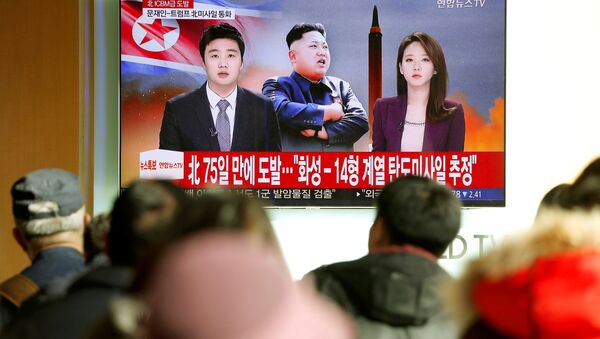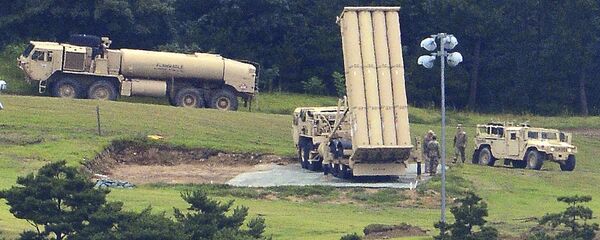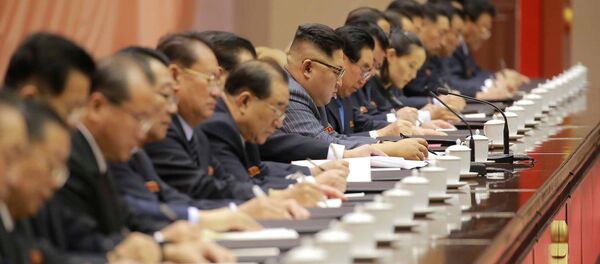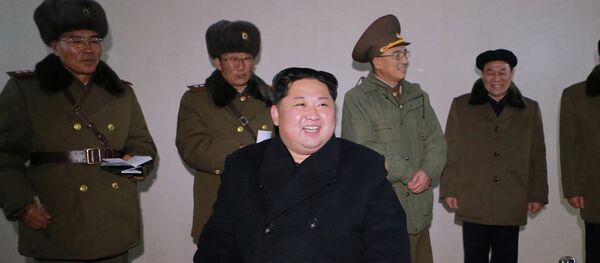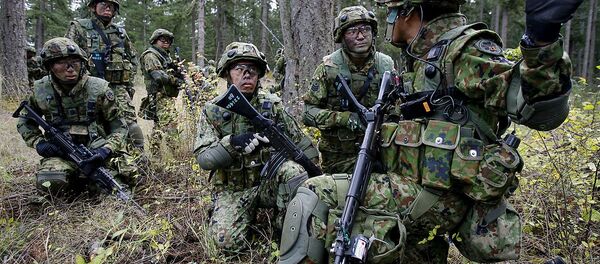The US military is preparing plans to launch a surgical strike targeting North Korea’s nuclear facilities that would "allow them to punch North Koreans in the nose," according to senior US officials quoted by The Telegraph newspaper on Wednesday.
Meanwhile, during a joint military training last week, US and South Korean forces reportedly practiced infiltrating North Korea to remove its nuclear weapons in case of a military conflict on the Korean Peninsula.
NO PREPARATION IN SOUTH KOREA
However, South Korea is not well prepared to face the consequences of possible retaliation from North Korea, in response to US military attacks, South Korean experts suggested.
"Seoul, for example, has about 10 million people living here. We’re right under the attack zone as far as retaliation from North Korea is concerned. We should be expecting almost immediate retaliation from the North Korean side. I don’t think US or South Korea forces can shoot down all the incoming missiles [from North Korea]. There will be dozens of missiles flying at the same time. I don’t think anybody would be able to shoot them down all at once. We must be in a pretty vulnerable position," Suh Kune-yull, a professor of nuclear engineering at Seoul National University, told Sputnik.
Amid reports that neighboring countries, including China, are taking steps to prepare for the consequences of a possible military conflict on the Korean Peninsula, it is shocking that South Korean government has not taken measures to handle such a scenario, the Seoul-based expert said.
"Nothing is really taking place [in South Korea], which is really surprising. The Japanese are getting ready. The United States is also getting ready, even in Hawaii or Guam. Even China and Russia are also getting ready for any potential disaster for any event taking place on the Korean Peninsula. South Korea has become the only exception of doing nothing. In fact, I don’t think the [South Korean] government is doing anything for this purpose. They’re still trying to invite the North Korean Winter Olympics team to PyeongChang. We’re being left alone. We’re not even having a drill for this," Suh said.
Kim Jae-chun, an international relations professor at Sogang University and a former South Korean government adviser, pointed out that South Korea did not even have adequate bunkers that could protect civilians in case of a nuclear warfare.
"South Korea has not done exercises like Americans have done in Hawaii, where they have bunkers built during the Cold War Era to hide in case of a nuclear war. In South Korea we don’t have such facilities that can hold those kinds of exercises," Kim said.
MOON’S POLICY
If the United States decides to launch a strike against North Korea, it would probably happen without endorsement or support from South Korea, experts suggested.
"When it comes to the surgical strikes, they need to be talking to [South Korean] President Moon Jae-in about the will and intention. I don’t think he’s going to agree on that proposal. Unless the United States solely decides to go its own way, then there’s a possibility [for the surgical strike]. Technically speaking, yes, they [the United States] can do it without any problem. But politically speaking, I do believe there are some political issues involved that they won’t be able to resolve in the foreseeable future," Suh said.
The policy of South Korean President Moon Jae-in could probably help explain the nation’s lack of preparation for possible warfare on the Korean Peninsula, according to the expert.
However, the expert is skeptical of such policies from the South Korean government.
"The government would probably say that if we go through any kind of anti-missile drills, the people would start to panic. There’ll be really concerned the economy will go down. But I don’t buy that. I think they’re taking the wrong kind of approach," Suh said.
The expert pointed out that it was alarming that the general public in South Korea did not seem to be overly concerned with the current development of the situation on the Korean Peninsula.
"The public is actually used to this kind of situation. I believe we’re immune to this kind of drastic geopolitical change that’s taking place around the Korean Peninsula. We’re immune to this kind of change, which a real threat from within. I’m really getting worried about ourselves, our own people and our own country. The situation is totally different than before, but I don’t think people are buying it. The government is just trying to convince us that nothing is going to take place," he said.
POSSIBLE WITHDRAWAL OF US TROOPS
The Seoul-based expert expressed concerns over the level of United States' commitment to protecting South Korea.
"Unfortunately, one thing for sure is that South Korea is going to be standing by, because we got basically no authority. For example, we got no weapons. We do have some missiles. But we got no nukes. I don’t think the United States is going to deploy tactical nuclear weapons on the Korean Peninsula again. We have to totally rely on American nuclear umbrella. I don’t think they’re going to protect South Korea utterly when New York or Washington DC might be under nuclear threat," Suh said.
The expert believes the United States may decide to withdraw its troops from South Korea in the near future.
READ MORE: US Suggests Expansion of Embargo Against DPRK, Expulsion of N Korean Workers
"I believe the United States may decide to pull their troops away from South Korea, probably sometime in the middle of next year. As far as South Korea and US alliance, I think there’s going to be a crack between these two countries. South Korea must be prepared to stand alone. When the US troops are withdrawn from the Korean Peninsula, it’ll be like the last nail in our coffin. By that time, it’ll be just too late. We’ll have nothing but conventional weapon systems, which are not enough to deal with North Korea’s nuclear-armed forces. It may come sooner than we expect," he said.
LEGACY OF US MILITARY OFFICIALS
Growing speculations on possible US military strike against North Korea could also be the result of US military officials hoping to preserve their personal legacy during their tenure, Professor Kim from Sogang University suggested.
"US military officials don’t want to see North Korea complete building ICBMs that can reach American soil. They don’t want to see that during their tenure, such as for general [Jim] Mattis [US Secretary of Defense] and [US National Security Advisor] McMaster. It would be the same for Trump. He doesn’t want to be the president that allowed North Korea to do so," he said.
Kim, though, admitted that another objective of such speculations could be forcing the North Korean leadership back to the negotiation table with conditions favorable to South Korea and the United States.
"I don’t think there’ll be a surgical strike to preempt North Korea’s retaliation capabilities. I do believe North Korea has augmented deterrence capabilities, with which they can deter American first strike. This means they have second strike deterrence capability. They still can’t strike US mainland because the ICBM hasn’t really been completed as of now. But they do have medium-range missiles that can deliver retaliation to South Korea and Japan," Kim said.
The expert added that this scenario would mean general war on the Korean Peninsula, and he did not think the United States wanted to get entangled in such a situation.

